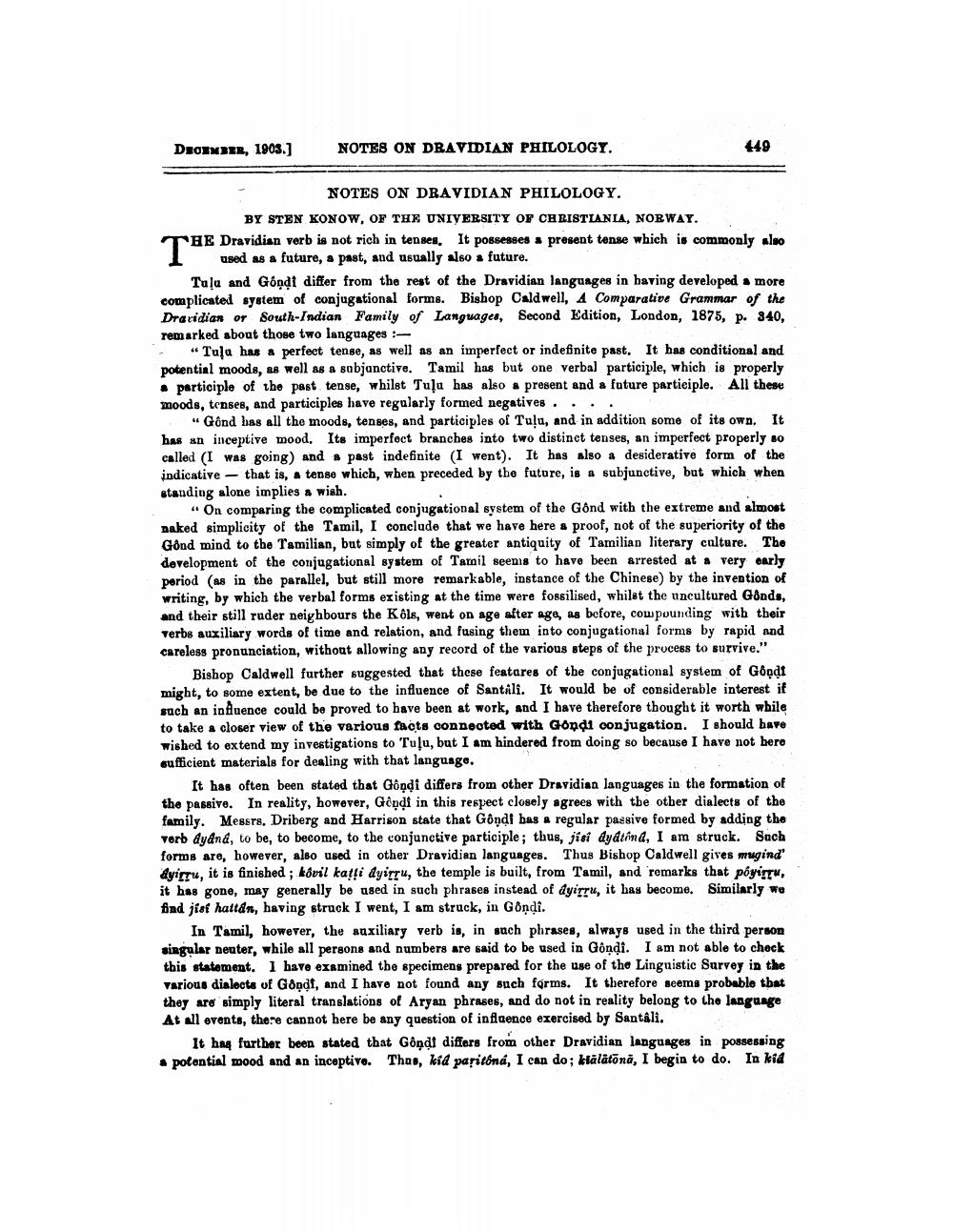________________
DEBER, 1903.)
NOTES ON DRAVIDIAN PHILOLOGY.
NOTES ON DRAVIDIAN PHILOLOGY. BY STEN KONOW, OF THE UNIVERSITY OF CHRISTIANIA, NORWAY. THE Dravidian vorb is not rich in tenses. It possesses present tense which is commonly also
used as a future, a past, and usually also a future. Tala and Gondt differ from the rest of the Dravidian languages in having developed a more complicated system of conjugational forms. Bishop Caldwell, A Comparative Grammar of the Dravidian of South Indian Family of Languages, Second Edition, London, 1875, p. 340, remarked about those two languages :
"Tula has a perfect tense, as well as an imperfect or indefinite past. It has conditional and potential moods, as well as a subjanctive. Tamil has but one verbal participle, which is properly . participle of the past tense, whilst Tuļa has also a present and a future participle. All these moods, tenses, and participles have regularly formed negatives. ...
“Gônd has all the moods, tenses, and participles of Tuļu, and in addition some of its own. It has an inceptive mood. Its imperfect branches into two distinct tenses, an imperfect properly so called (I was going) and past indefinite (I went). It has also a desiderative form of the indicative - that is, a tenso which, when preceded by the future, is a subjunctive, but which when standing alone implies a wish.
"On comparing the complicated conjugational system of the Gônd with the extreme and almost naked simplicity of the Tamil, I conclude that we have here a proof, not of the superiority of the Gônd mind to the Tamilian, but simply of the greater antiquity of Tamilian literary culture. The development of the conjugational system of Tamil seems to have been arrested at a very early period (as in the parallel, but still more remarkable, instance of the Chinese) by the invention of writing, by which the verbal forms existing at the time were fossilised, whilst the uncultured Gônds, and their still ruder neighbours the Kols, went on age after age, as before, compounding with their verbs auxiliary words of time and relation, and fusing them into conjugational forms by rapid and careless pronunciation, without allowing any record of the various steps of the process to survive."
Bishop Caldwell further suggested that these featares of the conjugational system of Goodt might, to some extent, be due to the influence of Santali. It would be of considerable interest if such an influence could be proved to have been at work, and I have therefore thought it worth while to take a closer view of the various facts connected with Gondi conjugation. I should have wished to extend my investigations to Tuļu, but I am hindered from doing so because I have not bere sufficient materials for dealing with that language.
It has often been stated that Gôndi differs from other Dravidian languages in the formation of the passive. In reality, however, Gîndi in this respect closely agrees with the other dialects of the family. Messrs. Driberg and Harrison state that Gôndi bas a regular passive formed by adding the vorb dyana, to be, to become, to the conjunctive participle; thus, jisi dydrind, I am struck. Sach forms are, however, also used in other Dravidian languages. Thus Bishop Caldwell gives mugind" dyirru, it is finished; kòvil katli dyirtu, the temple is built, from Tamil, and remarks that pôvirtu, it has gone, may generally be used in such phrases instead of dyirru, it has become. Similarly we find jíof hatten, having struck I went, I am struck, in Gôndi.
In Tamil, however, the auxiliary verb is, in sach phrases, always used in the third person singular Deater, while all persons and numbers are said to be used in Gôndi. I am not able to check this statement. I have examined the specimens prepared for the use of the Linguistic Survey in the various dialects of Gondt, and I have not found any such forms. It therefore seems probable that they are simply literal translations of Aryan phrases, and do not in reality belong to the language At all ovents, there cannot here be any question of influence exercised by Santali.
It hay further been stated that Göndt differs from other Dravidian languages in possessing • potential mood and an inceptivo. Thas, kid paritóná, I can do; klälàtona, I begin to do. In kid




